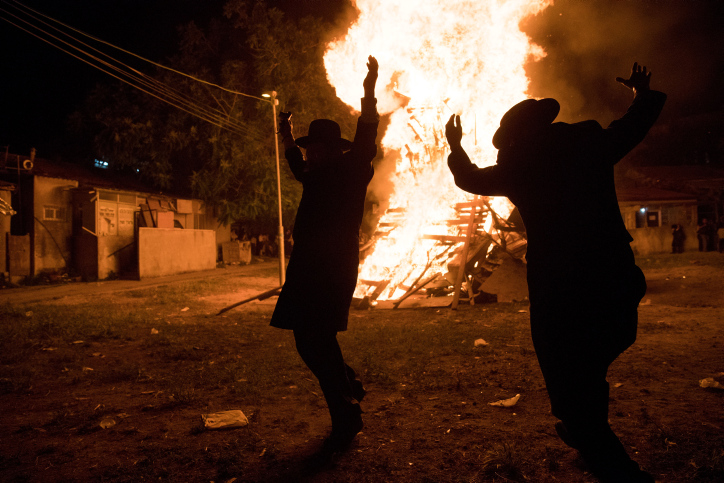
The auto-de-pe bonfire that burned in the middle of the Haredi street attracted many of the locals. The crowds of Haredi men and women, young men and women, children and girls stood around the fire with excited faces, happy, and watched the execution. The celebrity on duty, went up in flames and breathed his last. The children watched with bated breath, for the adults it was on high. When the ceremony was over, and the suspect's spirit announced that it was retiring from the ravages of this world, a collective sigh of relief was heard.
We did it, said the happy crowds. We succeeded, they whispered to each other. Who would have believed it? They continued to stare at the ghettos and had difficulty leaving the sooty square.
This picturesque description took place this week, no less, in the heart of the Haredi square – when a well-known writer was suspected of serious acts. The bonfire and the crowds – symbolically only – received the attention of the Haredi WhatsApp and Facebook networks, and the death was announced with the announcement of the celebrity's retirement from public life. But with the evaporation of the last of the physical flashes, one serious sociological question remained: Where did the joy for the dead come from [they have already taken his books off the shelves]? What is the wonderful happiness [he committed suicide? What does his wife say]? How did hundreds of thousands of intra-Haredi correspondences turn in the past week into a colorful, obsessive, not to say cruel, preoccupation with the man's fate? What is the nature of this single event that changed the face of Haredi discourse?
And the sad answer to this bewilderment is the childishness of the sector. The pettiness, vindictiveness, and courtliness that so characterize it. On the day these childish-collective traits were defeated, an unfamiliar kind of happiness enveloped the street.
True happiness, but also sticky and thick. One that also comes at a price. Maybe too high a price.
The Haredi street, as is well known, is made up of an endless number of currents, opinions, beliefs, and worldviews. Most of them are characterized by hatred, aversion, and rejection of the other. A number of rabbis and courts belong to one group, another number to the rival group. Each of the groups is willing to swear that the other is unworthy, perhaps even not Orthodox, and under the auspices of this conception, the Haredi street naturally becomes both childish and petty, and also responsible for quite a few serious crimes that carry long-term social harms. After all, in the tangle of courtship, hatred, and currents, no one has time to deal with the truly serious things.
The latest case is a clear example of this behavior.
According to suspicions at least, rabbis and courts knew about his serious actions. However, they chose not to expose them for various reasons. Even after the publication in Haaretz, the Haredi media, not to mention the Torah scholars and seminaries, remained silent, and no senior rabbi came out to call for his dismissal. Only after the madness in the field were they forced to force him to resign. They, in a way that surprised even them, discovered that WhatsApp and Haredi Facebook were stronger than they thought, and they could not ignore them. For the first time, the "healthy" field triumphed over childishness, courtliness, and fear.
This is where true happiness comes from.
But as mentioned, it was thick, sticky, and sometimes even repulsive. The celebrity became a puppet that was put on the stake to the cheers of the masses who did not stop rummaging through WhatsApp networks to find out if he had already committed suicide, and the other culprits, such as the rabbis who hid, the rotten system, the educational and especially childish neglect that was barely overcome by WhatsApp and Facebook, will continue to exist.
Many wondered this week? Why won't a model forum like the religious-national 'Tekna' be established on Haredi Street? A forum that would have stopped the madness we witnessed years ago? Well, it must be said again: We are still childish, and a forum of this kind is too big for us: Can anyone imagine a mature Haredi forum that is capable of containing three rabbis from different schools, from Rabbi Charlo to Rabbi Shapira? From Rabbi Ariel to Rabbi Stav? That important Haredi women like Rebbetzin Piotrkowski, who understand and work in the field, will build it together - as equals? That it will have a public right to exist that includes a public call for victims to come and appear before the committee? That it will do everything it can to overcome childishness, courtliness, and teasing? Come on.
Such a forum, by the way, would have prevented a question that also came up this week, albeit in a very weak voice: Did anyone even listen to the response of the celebrity Gopo? Was he summoned to any court? Did the pattern in which the Haredi street operates - ignoring on the one hand and bringing it to the fore on the other - have he any ability to respond? Was he, for example, suggested years ago - if the suspicions are well-founded - to abandon the field of education in which he became the High Priest?
But the collective ultra-Orthodox childishness would not allow this. It preferred to leave the situation as it was. When the bubble burst, as mentioned, everyone felt supreme happiness.
We can too. We too have me too, the eyes of the masses shone. But this happiness, it turns out, comes at a high price.